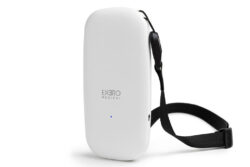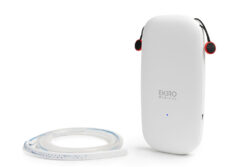In first, Israeli MedTech startup implants sensor detecting early GI surgery complications
Source:
Israel Newsstand
Date:
July 21, 2020
Original Article:
![]()
Exero Medical has developed a life-saving device to help surgeons detect anastomotic leaks in patients early after GI surgery. The sensor has a minimal impact on the surgical procedure, it adds negligible risk and minimal patient discomfort
By ILANIT CHERNICK
Israeli MedTech startup Exero Medical, which has developed a revolutionary device to help surgeons detect anastomotic leaks in patients early after GI surgery, has completed the first human implantation of its sensor.
The implant procedure was part of an ongoing clinical trial conducted at Rabin Medical Center led by Prof. Nir Wasserberg, chairman of the Israel CRS society and director of the colorectal division, announced the startup this week.
The study team reported the successful placement of the sensor and data collection during low anterior resection surgery for rectal cancer.
“The initiation of clinical data collection is a critical step towards providing a reliable detection tool for surgeons” explained Wasserberg. “The fear of anastomotic leak is the one that keeps GI surgeons up at night and one that represents a true clinical need. Exero’s sensor is designed to provide surgeons with insight on patients’ healing processes so they can determine the best course of action and improve clinical outcomes.”
Asked about how the device works, CEO of Exero Medical Dr. Erez Shor told IsraelNewsStand that their technology is based on measuring the natural signals generated by the gut to track patient recovery after major surgery and alert the medical staff on any complication.
“The technology was developed with Clalit, the largest Health maintenance organization in Israel in order to address the most devastating complication of gastrointestinal surgery – anastomotic leak,” he explained.
With over one million people being diagnosed with colorectal cancer every year, patients undergo a colectomy. During this procedure, the surgeon removes a part of the colon and then reattaches the two parts of the colon on either side of the removed section.
“A major challenge with these common surgeries is that in 6-10% of patients [experience] an adverse event called an anastomotic leak, which can result in life threatening complications with a significant risk of mortality,” Shor said.
He made it clear that the anastomotic leak is not a result of a malpractice.
“The surgeon’s work can be flawless, but during the healing process the reattached tissue may not heal properly, leading to inflammation and leaks,” he said. “Until this point, no solution is available to prevent or detect these leaks early, before they become catastrophic.”
This is where Exero Medical comes in with its developed wireless sensor for early detection of anastomotic leaks (AL) following GI surgeries.
Shor explained that the sensor is implanted near the surgical site, and it uses biosensing technology and machine learning algorithms that are trained to detect tissue healing progress. “[This] can determine if the tissue is healing or deteriorating in a way that could harm the patient,” he said. “Insights derived by the sensor can be used by clinicians to assess the patient’s healing process, enabling them to intervene before the leak becomes life-threatening, or alternatively, to allow a patient to be discharged earlier from the hospital if the tissue is healing properly, thereby reducing in-hospital admission days.”
Shor added that using sensors in this way also has a minimal impact on the surgical procedure, it adds negligible risk and minimal patient discomfort.

Above Image: Prof. Nir Wasserberg who has performed the ongoing clinical trial.
(Credit: Exero Medical)
Discussing how the device will change the future of GI surgeries for both doctors and patients, Shor said that the sensor has the potential to dramatically change the outcome of patients suffering from anastomotic leaks and minimize its life-threatening, costly consequences.
“It is also designed to support clinical decisions on the early release of patients who are recovering well, thereby potentially saving cost for both normal patients as well as patients who developed complications,” he highlighted.
He pointed out that at the moment, neither advancements in surgical techniques nor the addition of more sophisticated tools such as surgical staplers have helped decrease the prevalence of leaks.
“Current tests and imaging modalities can only somewhat reliably detect the leak starting from the sixth to tenth postoperative day, which may already be life threatening for a patient,” Shor said. “The best way to circumvent these complications is by detecting the leak as early as possible or perhaps before it actually happens.”
He stressed that the sensor can easily fit into the current surgical workflow of GI surgeries, as implantation by the surgeon is a simple process.
“In GI surgery aftercare, Exero will provide data indicative of healing for the first time, which can help provide peace of mind for surgeons and other medical staff involved in the post-operative care of patients,” Shor continued. “The anastomotic leaks challenge is the one that keeps surgeons awake at night and can cause patients to needlessly undergo another surgery or be left until they have a catastrophic event that can be lethal.”
By monitoring the tissue following surgery, the sensor can potentially prevent infectious complications which place a huge burden on the health system, adding that the direct cost of a leak exceeds $28,000 per patient and is estimated to exceed $75,000 in some cases.
“For patients, knowing that your medical team has the data they need to properly assess your progress is a major relief as well. It means that if there is an issue, interventions can be less invasive when performed earlier,” Shor emphasized.
Asked whether this technology was being implemented in Israel and worldwide, Shor said that the first version of the sensor is already being tested in patients undergoing surgery at Beilinson hospital.
“We expect to see it in clinical use within two years,” he continued. “We are encouraged by our first human implantations of the sensor, which had a successful placement and data collection during low anterior resection surgery for rectal cancer.”
He stressed that his milestone is another step towards proving the efficacy of the sensors. Clinical trials ensuring the safety and efficacy of medical devices are of high importance and we have only just started this journey.
“We hope they will be used in Israeli hospitals in 2021 in a larger scale multi-center clinical trial to show that they improve patient outcomes,” Shor said. “This trial will also be a part of our regulatory approval process.
“Following both FDA clearance and CE-mark, we will look to integrate our technology into healthcare systems starting with the US and Europe,” he added.
Concluding, Shor said that Exero was “looking forward to developing a reliable anastomotic leak detection system, that will save lives and reduce suffering.”



